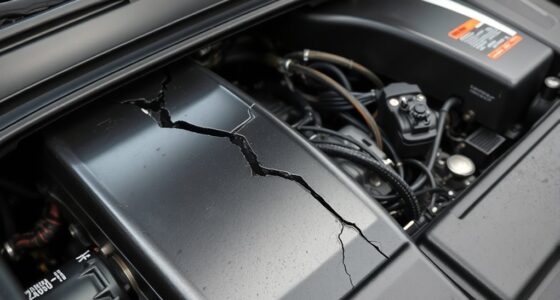When you add aftermarket modifications to your vehicle, your warranty risks may change. Some upgrades can void or reduce coverage, especially if they cause damage or aren’t approved by the manufacturer. Insurance companies may also see such mods as increasing risks, potentially affecting your claims. To protect yourself, review your warranty terms and discuss any upgrades with your dealer or insurer beforehand. Understanding these details helps keep your coverage secure—there’s more to contemplate if you continue exploring this topic.
Key Takeaways
- Aftermarket modifications can void or impact your vehicle’s warranty, depending on manufacturer or dealership policies.
- Review your warranty terms carefully before installing aftermarket parts to understand coverage limitations.
- Some modifications may not void the warranty if they are approved or installed professionally, but always check with the dealer.
- Installing non-approved aftermarket parts might lead to denial of warranty claims related to those modifications.
- Communicate with your insurer and dealership about planned upgrades to assess potential effects on coverage.

When you modify your vehicle with aftermarket parts, it can boost performance and personalize your ride, but these changes often impact your warranty coverage. One of the main concerns is understanding how such modifications influence your insurance implications. Insurance companies typically view aftermarket upgrades as potential risks, especially if they increase the likelihood of damage or accidents. If you get into a collision or your vehicle sustains damage, your insurer might scrutinize whether the modifications contributed to the issue. In some cases, they could deny coverage altogether if they determine the upgrades were the primary cause of the problem. It’s essential to review your policy and speak with your insurer before making modifications to understand how your coverage might change. Additionally, reviewing warranty terms and conditions can help you understand what modifications are permitted without voiding your coverage.
Modifying your vehicle can enhance performance but may affect warranty and insurance coverage.
Dealership policies also play an *essential* role in this scenario. Many dealerships have strict policies regarding aftermarket parts, especially if they are not installed or approved by the manufacturer. Some dealerships may refuse to service or even sell vehicles that have been extensively modified, citing warranty concerns. They might void your warranty if they find modifications that alter the vehicle’s original specifications or safety features. Even if the modifications are minor, dealership policies can vary widely. Some may be more lenient, especially if the aftermarket parts are of high quality and professionally installed, while others could be very strict, voiding the entire warranty for any non-factory parts.
It’s important to remember that warranties are not universal, and their terms can differ *considerably* between manufacturers and dealerships. Many manufacturers include clauses that specify which modifications are acceptable and which are not. If you plan to modify your vehicle, it’s wise to review your warranty agreement carefully or consult directly with your dealer to clarify what’s permissible under your coverage. Keep in mind that even if a modification doesn’t immediately void your warranty, it might still affect future claims, especially if the modification is linked to the damage or issue at hand.
Ultimately, understanding the interplay between aftermarket modifications, insurance implications, and dealership policies is key to protecting yourself financially and legally. Do your research, communicate openly with your insurer and dealer, and consider how your upgrades might influence your vehicle’s warranty. That way, you can enjoy customizing your ride without unintentionally risking your coverage or coverage costs down the line.
Frequently Asked Questions
Can I Install Aftermarket Mods Without Voiding My Warranty?
You can install aftermarket mods without voiding your warranty, but it depends on warranty exceptions and modification impacts. If the modifications don’t cause damage or failure, your warranty often stays intact. However, if a repair is needed due to a mod’s influence, the manufacturer might deny coverage. Always check your warranty terms and consult your dealer before making changes, so you understand how your modifications could affect your coverage.
Are There Specific Modifications That Automatically Void My Warranty?
Certain modifications, like installing a new exhaust system or turbocharger, can automatically void your factory warranties, especially if they cause damage or are not approved by the manufacturer. Always check your warranty terms and legal considerations before making changes. If a modification is non-invasive and doesn’t affect the vehicle’s core systems, it might not void your warranty, but confirm with your dealer to avoid surprises.
How Can I Prove a Modification Didn’t Cause a Problem?
Did you know over 50% of warranty disputes involve modifications? To prove your modification didn’t cause a problem, you should undergo an inspection process by certified experts. Their detailed report can serve as vital evidence in your case. Expert testimony helps establish that the issue isn’t linked to your modifications, providing you with a stronger defense if your warranty claim is challenged. Keep thorough records to support your claim.
Do Warranty Policies Differ Between Manufacturers and Models?
Yes, warranty policies do differ between manufacturers and models. You should review the manufacturer policies and model-specific rules for your vehicle, as each company sets its own coverage limits and conditions. Some manufacturers are more lenient with aftermarket modifications, while others are stricter. Always check your warranty documentation or contact your dealer to understand exactly what’s covered and any restrictions related to your specific model.
What Steps Should I Take Before Modifying My Vehicle?
Before modifying your vehicle, you should research your manufacturer’s policy on aftermarket upgrades, especially for performance upgrades and aesthetic enhancements. Check your warranty coverage to understand what might void it. Talk to your dealer or manufacturer to clarify any restrictions. Gather information on reputable shops and parts to ensure quality. Finally, document all modifications and keep receipts to protect yourself if warranty issues arise later.
Conclusion
Remember, your vehicle is more than just transportation—it’s an extension of you. While aftermarket modifications can boost performance and style, they can also void your warranty if you’re not careful. Think of your warranty as a shield protecting your investment; customizing your ride without understanding the rules can leave you exposed. So, weigh your choices wisely—after all, the road to customization is tempting, but always stay on the safe side.









